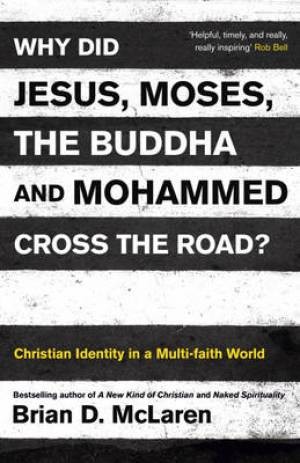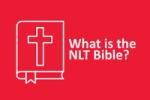Why Did Jesus, Moses and Mohammed Cross The Road?
Aaron Lewendon - Category Manager
It’s been called Brian Mclaren’s most important book yet.

Why Did Jesus, Moses, The Buddha and Mohammed Cross The Road? The title is so long, we can't even fit it into the headline!
The book asks important questions, namely: is it possible for Christians to get on and work with people of other faiths? And, can they do this while retaining their own identity and core beliefs?
Brian's aim is to prove that Christians can be strong and determined in their beliefs, while also being tolerant and benevolent toward others.
Those familiar with the writer’s previous books (and the much comment they cause in the blogosphere) will know that Brian is rarely accused of being hostile, but often accused of being weak and watering down the gospel.
This book again affirms Brian’s desire to work with people of all faiths for the good of society. It provides some entertaining and thought-provoking anecdotes of how the author continually practices what he preaches.
But Brian would argue that he's not watered down his beliefs, and still holds key doctrines to be true. He spends a quarter of the book examining “the doctrinal challenge” to his inclusive views.
Chapter titles include: “How the Doctrine of the Holy Spirit Can Empower Our Encounter With The Other” and “How The Doctrine of Original Sin Can Help Christians Be Less Sinful”.
The former contains a touching story of how the Holy Spirit worked through a fiery Pentecostal preacher at an interfaith gathering. The latter merely points out that people have misinterpreted original sin to be a basis for excluding others: 'we are saved, but you are sinful'. The chapter argues that the very attitude of ‘we’re in and you are out’ is sinful.
Critics will rightly point out that Brian's open willingness to re-imagine, and in some cases re-define, doctrines is alarming. Rather than examining doctrines, he sometimes twists them to fit in with his pre-conceived views on inter-faith relations.
Brian’s style is engaging, entertaining and very easy to read. His passion for reaching out to people of other faiths is contagious and welcome. But the elephant in the room is ignored throughout the book; namely, the necessity for evangelism.
Making little mention of the great commission – Jesus command to “make disciples”, Brian’s theology is lacking in a major way. He has rightly emphasised the importance of making a difference in people’s earthly lives in relieving poverty, social justice, etc. He should be commended for encouraging people of all faiths to work together for the good of society, and his words on this are inspirational. But what of people’s eternal destinies?
He mentions his “friend” Rob Bell (who also endorses the book) and the controversies around Love Wins (which appeared to argue that everyone goes to heaven eventually). But like Rob, Brian is too slippery in his views to fully nail his colours to the mast and state his views on heaven and hell. Perhaps this is best as it allows the reader to examine Brian’s books through their own lens.
If you come to the book believing that people must become Christians in order to enter heaven, you’ll be put off by Brian’s failure to acknowledge this. But you’ll also be encouraged, and perhaps challenged, to love people like Jesus loved them. If you come to the book believing God’s love will eventually save everyone, you’ll find yourself in agreement with the vast majority of Brian’s book.
Whatever your theology, there’s plenty that every Christian can learn from Brian Mclaren. All can agree that if Jesus, Moses, the Buddha and Mohammed crossed the road, it wouldn’t end in bloodshed. Yet when each of these people’s followers come into contact it’s often full of hostility, and sometimes physical as well as verbal wars. That problem is one that needs to be addressed. Brian Mclaren has done the Church a service in beginning that conversation. But neither Brian nor his critics would want this book to be the last word.
Latest Blogs

Bible
What is the New International Version (NIV) Bible?
Finding the right Bible isn’t easy. There are dozens of translations and hundreds of editions to choose from. Our new series of guides is here to answer your questions about the different Bibles on offer today.

Bible
What is the English Standard Version (ESV) Bible?
Finding the right Bible isn’t easy. There are dozens of translations and hundreds of editions to choose from. Our new series of guides is here to answer your questions about the different Bibles on offer today.

Featured
What is the King James Version (KJV) Bible?
Finding the right Bible isn’t easy. There are dozens of translations and hundreds of editions to choose from. Our new series of guides is here to answer your questions about the different Bibles on offer today.

Featured
What is the New Living Translation (NLT) Bible?
Finding the right Bible isn’t easy. There are dozens of translations and hundreds of editions to choose from. Our new series of guides is here to answer your questions about the different Bibles on offer today.

Bible
Choosing The Right Bible
With more than 20 English Language translations each available in 25 or more different editions the choice of Bibles excites and bewilders. Choosing the right Bible for you is important - even if you already have more than one.

Spiritual Growth
LENT COURSES - How to choose the right one for you
Long overshadowed by the celebrations of Easter Sunday, Lent is being rediscovered as a sacred time of reflection and renewal in its own right and a time of preparation for the joyous seasonal finale.
